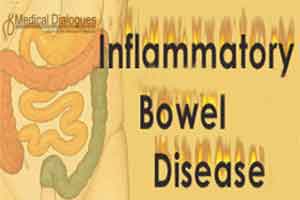- Home
- Editorial
- News
- Practice Guidelines
- Anesthesiology Guidelines
- Cancer Guidelines
- Cardiac Sciences Guidelines
- Critical Care Guidelines
- Dentistry Guidelines
- Dermatology Guidelines
- Diabetes and Endo Guidelines
- Diagnostics Guidelines
- ENT Guidelines
- Featured Practice Guidelines
- Gastroenterology Guidelines
- Geriatrics Guidelines
- Medicine Guidelines
- Nephrology Guidelines
- Neurosciences Guidelines
- Obs and Gynae Guidelines
- Ophthalmology Guidelines
- Orthopaedics Guidelines
- Paediatrics Guidelines
- Psychiatry Guidelines
- Pulmonology Guidelines
- Radiology Guidelines
- Surgery Guidelines
- Urology Guidelines
Inflammatory bowel disease linked to increased risk of heart attack

Ohio, USA: Inflammatory bowel disease (IBD) is associated with a 12 times increase in the risk of heart attack or myocardial infarction (MI) compared with non-IBD patients, according to a new study published in the journal Inflammatory Bowel Diseases. The relative risk of MI was highest in younger patients and decreased with age.
Over the five-year study period, people with IBD were 25 percent more likely than those without the disorder to suffer MI, the study found.
IBD involves chronic or recurring inflammation of the gastrointestinal tract. Ulcerative colitis and Crohn’s are the most common forms. People with Crohn’s have inflammation throughout the digestive tract, while in ulcerative colitis, only the large intestine is inflamed.
While chronic inflammation has long been linked to an increased risk of cardiovascular disease, the potential for conditions like Crohn's disease (CD) and ulcerative colitis (UC) to lead to MI isn't as well understood, the study team notes.
Mahazarin Ginwalla, University Hospitals Cleveland Medical Center, Ohio, and colleagues conducted this study to determine the relationship between IBD and myocardial infarction (MI).
For the purpose, the team examined a nationwide database of medical records for more than 29 million people, including almost 132,000 with ulcerative colitis and 159,000 with Crohn's disease. They used data from a large commercial database (Explorys, IBM Watson) that aggregates electronic medical records from 26 nationwide health care systems.
Also Read: Patients of inflammatory bowel disease at higher risk of prostate cancer, reports study
Key Findings:
- Prevalence of MI was higher in patients with UC and CD versus non-IBD patients (UC 6.7% vs CD 8.8% vs non-IBD 3.3%).
- The odds of MI in IBD patients overall were highest in younger patients and decreased with age.
- IBD patients ages 30 to 34 were 12 times more likely to have a heart attack than people in their age group without IBD.
- By age 65, however, people with IBD were only about twice as likely to have MI as people without these conditions.
- After adjusting for age, race, sex, and traditional cardiovascular risk factor, IBD conferred greater odds of MI.
Also Read: I/V iron replacement among anemic inflammatory bowel disease patients safe : Study
"IBD should be regarded as an independent risk factor for the development of heart disease," said senior author Dr. Ginwalla told Reuters Health.
"This means people with IBD should be monitored carefully for cardiac risk factors like smoking, obesity, hypertension, diabetes and high cholesterol, said Ginwalla". "Treating risk factors, and keeping symptoms of IBD controlled, may lower the risk of heart attacks."
"These findings emphasize the need for aggressive risk factor reduction in IBD," concluded the authors.
For further reference log on to https://doi.org/10.1093/ibd/izy354

Disclaimer: This site is primarily intended for healthcare professionals. Any content/information on this website does not replace the advice of medical and/or health professionals and should not be construed as medical/diagnostic advice/endorsement or prescription. Use of this site is subject to our terms of use, privacy policy, advertisement policy. © 2020 Minerva Medical Treatment Pvt Ltd